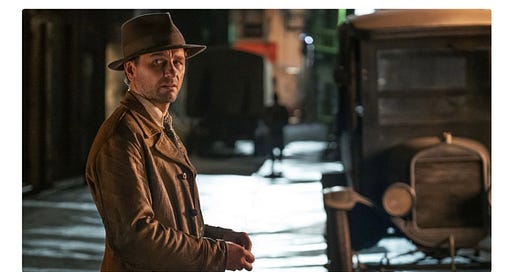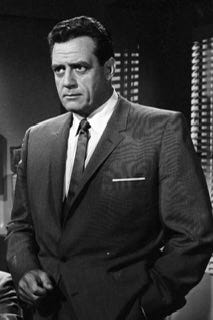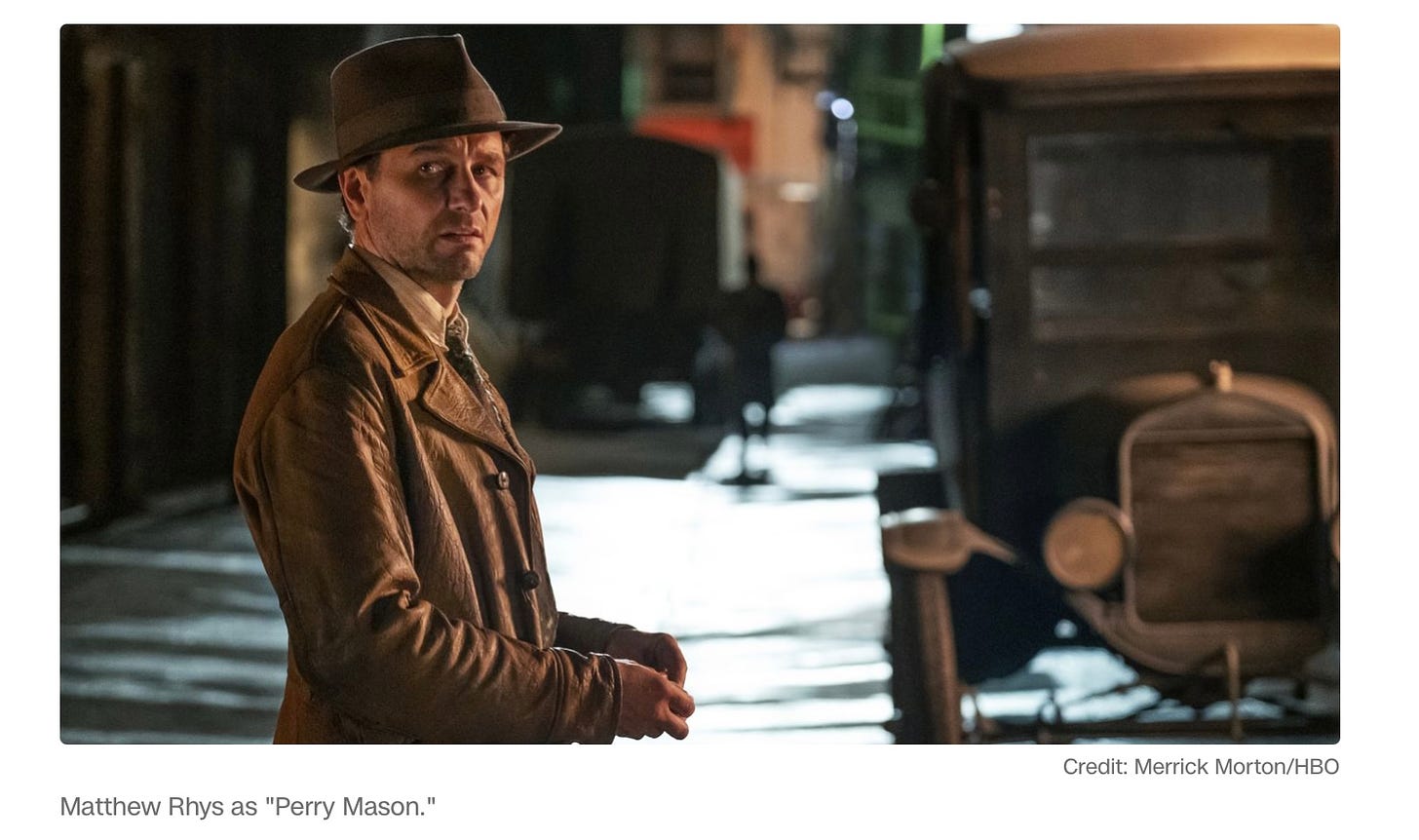The Pleasures of the Finale of the First Season of “Perry Mason”
The series is about to return for a 2nd season. Here’s what I wrote about the 1st season finale. Originally published in CNN Opinion, August 2020, I wonder if I’d have the same reaction to it today?
For me and many others, HBO’s “Perry Mason” reboot has been a dark mirror – but after its season finale last week, an immensely satisfying one.
“Perry Mason” draws its name (though not much else) from the 1957 series, which appealed to a generation that had witnessed Joseph Welch’s takedown of Joseph McCarthy during televised hearings, but had yet to see the flowering of women’s rebellion against their expected role of “silent mainstay of a male hero.”
Back then, this seemed realistic, even gritty. We loved watching Raymond Burr as Perry, stern and patriarchal in his well-appointed mid-century-modern offices, masterful on the stand, win the day for justice
.
We didn’t know that Burr was in fact a closeted gay man, and the writers probably didn’t realize that Barbara Hale, his girl Friday (spunky and smart, though mostly silent) provided a glimmer of working-girl independence that foretold the coming of Women’s Lib.
We were on the cusp of a period of enormous social change. Not quite there yet – but we believed in its possibility.
The 2020 series, in contrast, arrived as we were slogging through the anxiety and boredom of an unending pandemic. Many of us appalled and exhausted by the constant stream of ugliness in our politics, by the administration’s limitless incompetence, crudeness, sexism and racism, and waiting for good news, any good news, to bring a moment of relief from three years of living under a President who seems to many Americans to get away with…well, everything.
Some of us are pretty depressed, aren’t we? Even Michelle Obama says she is.
We take our antidotes where we find them. And many of us – particularly younger viewers, who were among those who watched the series in huge numbers digitally – have found and fallen in love with this new Perry Mason, with its depleted, emotionally raw Perry (Matthew Rhys), and so different from the robust, commanding Burr of the original show – which ran until 1965 – and its grim 1930s social landscape of haves and have-nots.
This “Perry Mason” is an implicit rebuke to President Donald Trump’s mythical “great” American past, fantasized, by him and his followers, as intact and thriving before immigrants, Black activists and feminists invaded.
The claustrophobic atmosphere of this reboot, relieved only by brief glimpses of Perry’s farm and a one-time plane trip with his aviator landlady Lupe (Veronica Falcon), is as airless as an existence shut-in by Covid-19. Every character wears a suffocating mask of one sort or another.
It might be hidden sexuality, it might be Perry’s glimpsed but never-discussed PTSD, it might be evangelist Sister Alice’s (Tatiana Maslany) history of abuse (when she takes off her blonde wig at the end, she looks like a totally different person).
Everyone in this show is in some way closeted, inhibited by social conventions from revealing important parts of their history or identity, and suffering because of it. The series is a fiction that feels more real in 2020 than either the original show (whose “signature” episode ending involved a confession that turns everything around) or the horrifying reality show called the Trump administration, which has turned “justice” into an unfulfilled fantasy.
It makes sense that the new series abandoned that 50’s-era signature ending, which worked well in a televisual world that had no unjustly convicted Blacks (actually, hardly any Black people at all.)
We may long for “Perry Mason” endings, but in real life that dream has been defeated over and over. The great confession scene wouldn’t play so well in 2020 – so the writers wisely refused it in the finale. Instead, Perry is warned by DA Hamilton Burger (Justin Kirk) that “no one ever confesses on the stand” and he abandons that strategy.
It all results in a hung jury, but the finale offers other kinds of wish fulfillments. The Black cop (Chris Chalk) who’s been kicked around by his corrupt and racist colleagues stops serving The Man and ultimately becomes Perry’s lead investigator. Perry’s Girl Friday, Della Street (played by Juliet Rylance, she’s a lesbian in this version, with a zaftig girlfriend and a mind as steady as it is sharp), is going to go to law school (paid for by Perry). And Perry’s closing argument takes a surprising feminist turn (no spoilers here).
The episode is full of pleasures for women, especially. Throughout, the rough-hewn Mason is schooled by Della in lawyerly strategy, good manners, and the ways of friendship (when he apologizes for a piggish comment about her girlfriend, she lets him off the hook for behaving “abominably”) and both Della and Lupe refuse to give up their ground to him, despite their affection for him.
Lupe, a self-described, no-nonsense “businesswoman,” has her eye on Perry’s farm for her airfield enterprise; despite that, she and Perry are pals and sometimes sex-buddies. It’s because of Lupe that I first became attached to the show. She is about as far from Rhys’ last TV romantic partner – the blonde, delicately featured Keri Russell in “The Americans” – as is imaginable.
Lupe’s body is thick, she’s undeniably sexy but not “pretty” – not by symmetrical, American Beauty standards – and in an earlier decade she would probably be cast, if cast at all, as what Hollywood typed as “mannish.”
Here, confident of her sexuality and her acumen, she’s a corrective to the formula that says you can be brown and desirable, but only so long as you look like Beyoncé or Jennifer Lopez. And she provides the line that kicks Perry into gear when he sulks about losing his house to her: “I’m a wetback and a woman,” she says, “I need to stay ahead of the rest of them.” You think you got it so bad, little boy?
In another time, I might have found all of this to be manipulative and annoyingly, cloyingly PC. But in 2020, after four years of Trump, I was grateful for just the sort of fantasy that is served up in this otherwise grim series.
The fun of a courtroom settling of scores belongs to a genre many Americans have lost faith in: the serving up of ultimate justice. Even many of those who supported this President in 2016 have been conscious of the walls being raised against what is right – the Mueller Report that many, like me, believe should have ended this presidency (and didn’t), the unmovable GOP-dominated Senate, the failure to convict after impeachment, and all the other “maybe this will be what does it” moments.
Metaphorically, a big confession scene—think: Trump on the stand. Trump being brought to account for his actions – would not ring true right now. Until it does ring true, I’m happy for the hour of pleasure that the finale of “Perry Mason” gave me.
If you liked this piece and want more Bordo on television and movies, I’ll be writing regularly on Substack, so please subscribe! And you might enjoy my little book on TV too: TV. It’s full of juices little pieces on the Sopranos, Mad Men, Killing Eve and others—and it’s pocket size, so you can take it anywhere!







